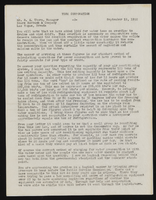Search the Special Collections and Archives Portal
Search Results
Jerry Engel oral history interview
Identifier
Abstract
Oral history interview with Jerry Engel conducted by Barbara Tabach on March 01, 2016 for the Southern Nevada Jewish Heritage Project. Engel highlights people, casinos, and other observations of Las Vegas, Nevada history that occurred since his move to the city in 1953. He provides insights about the role of an accountant in the gaming industry. He also discusses the influence of Jewish business leaders in an array of local gaming and non-gaming issues, including the retail world, Jim Crow era segregation, and the astonishing growth of the valley over six decades.
Archival Collection
Marion Earl oral history interview
Identifier
Abstract
Oral history interview with Marion Earl conducted by Robert Pearce on March 13, 1976 for the Ralph Roske Oral History Project on Early Las Vegas. Earl discusses relocating to Las Vegas, Nevada in 1923, serving as a member of the board of directors for the Chamber of Commerce, and then being elected president of the chamber in 1941. He also discusses being elected justice of the peace in 1934, and serving for two terms.
Archival Collection
UNLV Libraries Collection of Primadonna Resorts, Inc. Promotional Materials and Reports
Identifier
Abstract
The UNLV Libraries Collection of Primadonna Resorts, Inc. Promotional Materials and Reports includes annual reports, financial reports, a press kit, press releases, promotional materials, and newspaper and magazine clippings for Primadonna Resorts, Inc. in Primm and Las Vegas, Nevada dating from 1970 to 1998.
Archival Collection
Elizabeth Garrison oral history interview
Identifier
Abstract
Oral history interview with Elizabeth Garrison conducted by Walter John Ritzau on February 25, 1977 for the Ralph Roske Oral History Project on Early Las Vegas. Garrison first talks about her schooling in Las Vegas, Nevada, the atomic testing, the Devils Hole in Ash Meadows, early church involvement, and some of the environmental aspects of Las Vegas. Garrison later describes her work for the Central Telephone Company and the Helldorado Parade.
Archival Collection
Grant Sawyer oral history interview
Identifier
Abstract
Oral history interview with Grant Sawyer conducted by Perry Kaufman on May 12, 1972 for the Ralph Roske Oral History Project on Early Las Vegas. In this interview, Sawyer discusses his campaign for Governor of Nevada and the differences between northern Nevada and southern Nevada social life. He then describes winning the election for Governor, the gaming industry, and explains why gaming was significant to his political career. Lastly, Sawyer discusses the Nevada Gaming Commission before and after he was Governor, and actions that he took against organized crime.
Archival Collection





